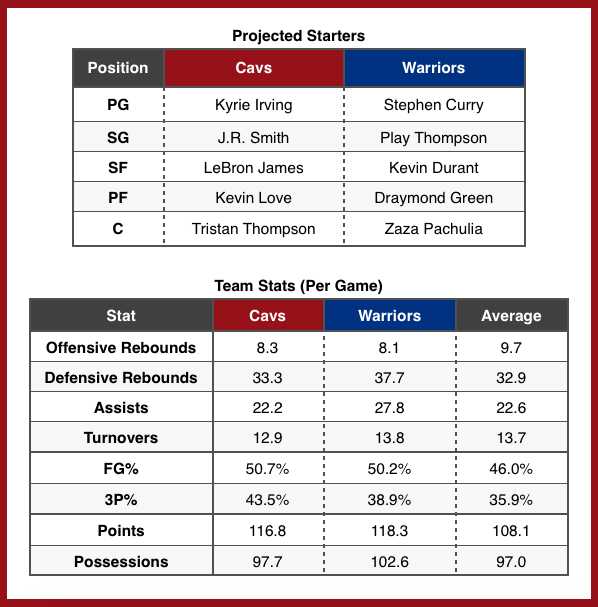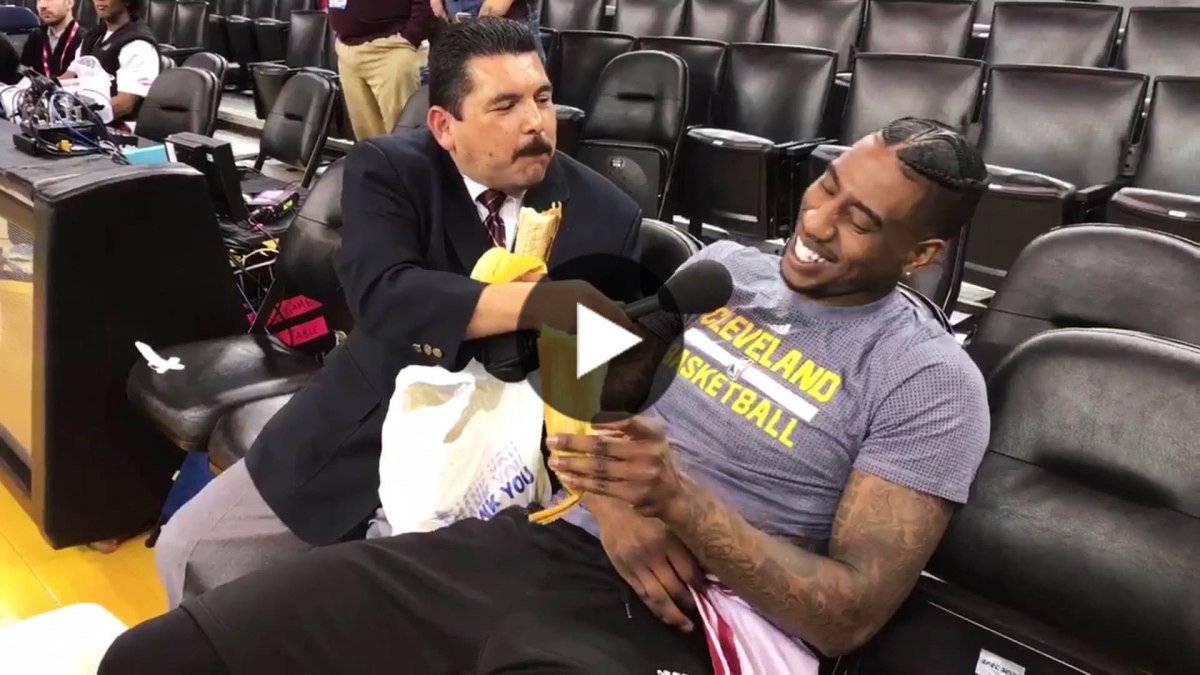Cleveland Cavaliers vs Golden State Warriors
2017 NBA Finals – Game One
:::: Click Here For Full CavsNation Pregame Stat Guide ::::
UPCOMING MILESTONES: LeBron James needs just five points to become the first player to record 6,000 points in the playoffs for his career. In addition, he needs two more threes to claim the 2nd most in league postseason history, passing Reggie Miller.

Deja vu. The Cleveland Cavaliers are back in the Finals, facing off against the superpower out West – the Golden State Warriors – for the third time in the row. After splitting the first two sets – 2015 and 2016 – one a piece, this most recent installment is posed to break the tie. As always, the first to four wins takes the series, but when both teams come into tonight with a cumulative playoffs record of 24-1 (the loss coming from the Cavaliers’ single defeat at the hands of the Boston Celtics in the Eastern Conference Finals), this is easier said than done.
In the 2016-17 regular season, the Cavaliers and Warriors faced off just twice, with each winning one. In the first matchup – on December 25th – the Cavaliers managed to slip by to pull ahead to a 109-108 victory after outscoring the Warriors by 8 in the fourth quarter. Each of the Big Three put up 20 or more points for the Wine and Gold – LeBron James with 31 points (and 13 rebounds), Kyrie Irving with 25 points (and 10 assists), and Kevin Love with 20 points. For Golden State, Kevin Durant led the way with an impressive 36 points and 15 rebounds. With Klay Thompson scoring 24 and Draymond Green scoring 16, Stephen Curry’s 15 points placed him as their fourth highest scorer. Setting the Cavaliers up to push ahead to the one point victory was their 18 offensive rebounds (compared to the Warriors’ five), 14 steals (compared to the Warriors’ eight), and seven fewer turnovers.
The most recent game – on January 16th – wasn’t as pleasant for the Cavaliers, as they where outscored by double digits in three of the four quarters in route to a 91-126 blowout. LeBron James’ 20 points on 33.3% shooting led the team, with Kyrie Irving’s 17 on 31.6% shooting right behind. Meanwhile, Klay Thompson (26, 47.1% shooting), Kevin Durant (21, 56.2% shooting), and Stephen Curry (20, 35.0% shooting) led the Warriors. In all, the Warriors outrebounded the Cavaliers by 23 while also having three more steals, seven more blocks, and 26 more assists.
In the playoffs this year, the Warriors have shown a few glimpses of vulnerability – such as in Game 1 against the San Antonio Spurs where they found themselves down 42 – 62 at half (before Kawhi Leonard’s injury and the Spurs subsequent collapse in the second half) – but on the whole have looked nearly perfect. Winning all 12 games they’ve played, they have averaged 118.3 points per game (1.5 more than the Cavaliers). When adjusting for pace in Offensive Rating (points per 100 possessions scored), the Cavaliers have actually ben better on paper – scoring 120.7 points per 100 possessions compared to the Warrior’s 115.8. However, the Warriors allow 5.5 fewer points on defense per 100 possessions than the Cavaliers. On shooting, Cleveland has been more efficient overall, shooting 50.7% from the field (Warriors: 50.2%) and an astounding 43.5% from three (Warriors: 38.9%).
Offensively, the Warriors have been deadly on pull-up shots – scoring 24.4 points per game on a league-high 45.2% shooting. In addition, they’ve found success in fast paced ball movement – averaging the second most passes per game (300.9), most assists per game (27.8), and the fewest dribbles (1.83) and seconds (2.48) per possession for an individuals’ touches. Coming in second for rebounds per game (45.8), the Warriors seem to have a clear advantage over the Cavaliers on the glass, as Cleveland has pulled in 41.6 per game – 10th best. Defensively, the Warriors have excelled at forcing turnovers – averaging a league best 9.2 steals per game in the playoffs. In addition, they’ve had the second most blocks, at 6.8 a game, and have held their opponents to a full 3.8% below their shooting averages – best in the league.
Three keys for Game One will be: (1) Limit fast break opportunities. The Warriors thrive off getting the ball in transition, averaging a league-best 20.7 fast break points per game. (2) Fight hard on the glass. In the game that the Cavaliers won against the Warriors this regular season, they managed to shoot 18 more shots than the Warriors due to out-rebounding them. Tristan Thompson’s effort down low will be key. (3) Have the Big Three show up and all perform on the same level. In the Celtics’ series, LeBron James averaged 29.6 points, 6.4 rebounds, and 6.8 assists on 58.0% shooting, Kyrie Irving averaged 25.8 points and 5.4 assists on 62.2% shooting (50.0% from three), and Kevin Love averaged 22.6 points and 12.4 rebounds on 48.6% shooting (53.5% from three). Numbers like these could present major problems for any opponent, including a team who went 73-9 the year prior and then added a previous MVP. With the Warriors boating a Big Four, Cleveland’s Big Three cannot dissolve into a Big Two or One.
Regardless of the outcome in Game One, remember: it’s not a single game elimination. The Cavaliers fell 104-89 in Game 1 last year. The only thing that matters is keeping composure, figuring out the most effective game plan, and playing to the level that they are capable of.
Key players to watch for on the Warriors will be Stephen Curry (averaging 28.6 points, 5.5 rebounds, and 5.6 assists per playoff game), Kevin Durant (averaging 25.2 points, 7.8 rebounds, and 3.7 assists per playoff game), and Draymond Green (averaging 13.9 points, 8.7 rebounds, and 7.2 assists per playoff game).
Tipoff is set for 9:00 EST and will be broadcast on ABC.
